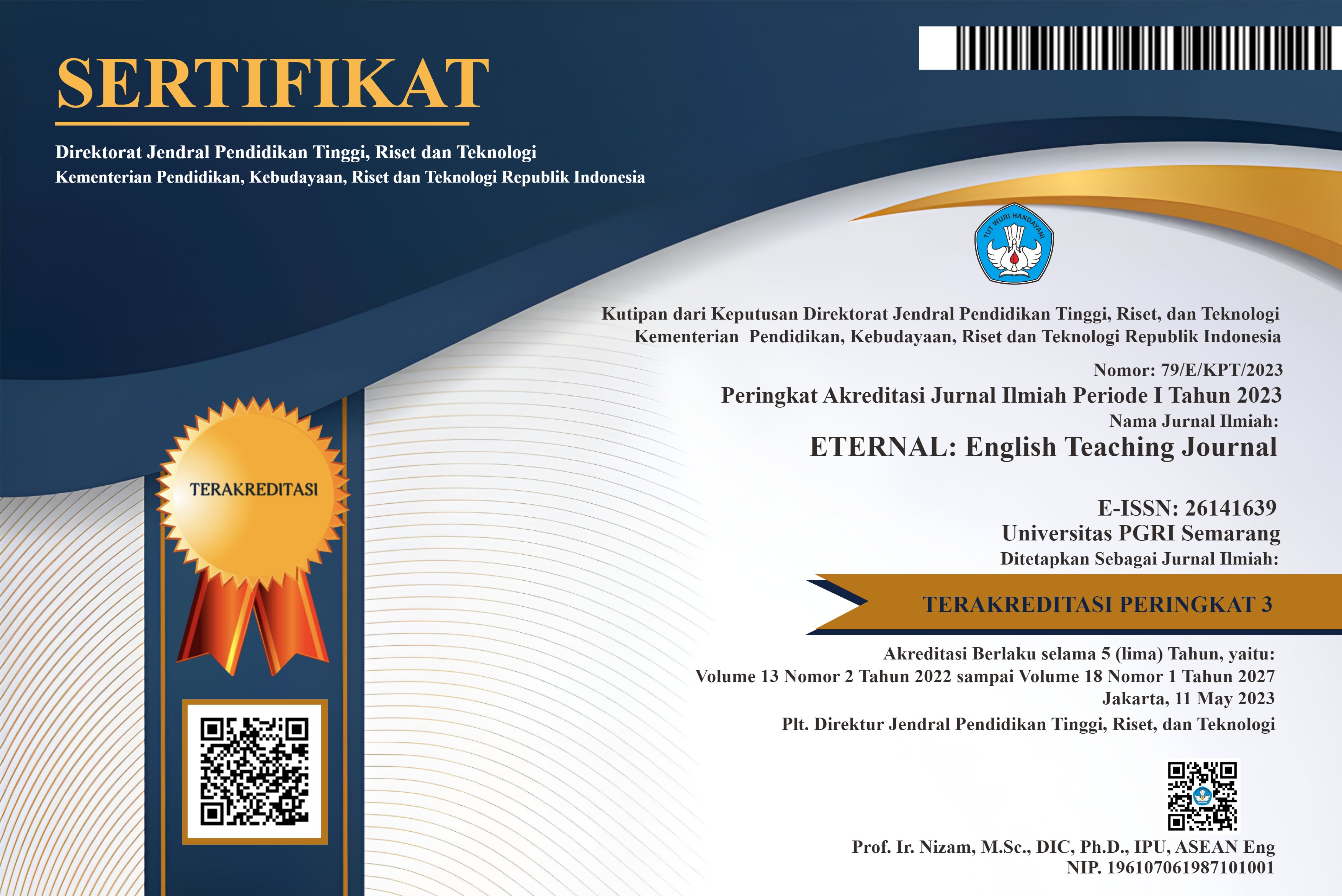Exploring Challenges Faced by English Language Teachers: Voices from EFL Teachers in Indonesia
DOI:
https://doi.org/10.26877/eternal.v16i1.1104Keywords:
EFL teachers, Merdeka Curriculum, teaching challenges, TEFLAbstract
Playing a vital role in EFL education, teachers often encounter challenges when teaching students English. This study focuses on exploring challenges faced by EFL teachers in Indonesia. The study was conducted through qualitative research design with a case study approach. A total of 5 male and female EFL teachers in senior high schools in North Sulawesi participated in interview sessions during the data collection. A semi-structured interview was conducted to obtain comprehensive descriptions of teachers’ challenges in teaching English in EFL context. The interview data was transcribed, coded, and grouped to decide the themes. The findings indicated that the primary challenges they encountered when teaching EFL including demotivated students, excessive working hours, numerous obligations, improper utilization of technology by students, and governmental expectations resulted from the Merdeka Curriculum. These results suggest complex problems experienced by teachers in Indonesia. Understanding teachers’ challenges in EFL education give insights to stakeholders, including policy maker and curriculum developers to optimize EFL education in Indonesia.
References
Barlian, U. C., Yuni, A. S., Ramadhanty, R. R., & Suhaeni, Y. (2023). Implementasi Pembelajaran Berdifierensiasi dalam Kurikulum Merdeka pada Mata Pelajaran Bahasa Inggris. ARMADA : Jurnal Penelitian Multidisiplin, 1(8), 815–822. https://doi.org/10.55681/armada.v1i8.742
Boy Jon, R., Embong, R., Purnama, B., & Safar Wadi, A. (2021). The Challenges of English Language Teaching in Indonesia. International Journal of English and Applied Linguistics.
Conley, H., & Jenkins, S. (2011). Still “a good job for a woman”? Women teachers’ experiences of modernization in England and Wales. Gender, Work and Organization, 18(5), 488–507. https://doi.org/10.1111/j.1468-0432.2011.00573.x
Fitriyah, C. Z., & Wardani, R. P. (2022). Paradigma Kurikulum Merdeka Bagi Guru Sekolah Dasar.
Li, S. (2023). Enhancing professional success: Chinese EFL teachers’ workplace buoyancy and cognitive flexibility. Heliyon, 9(2). https://doi.org/10.1016/j.heliyon.2023.e13394
Lo, C. K. (2023). What Is the Impact of ChatGPT on Education? A Rapid Review of the Literature. In Education Sciences (Vol. 13, Issue 4). MDPI. https://doi.org/10.3390/educsci13040410
Maruf, Z., Sandra Rahmawati, A., Siswantara, E., & Murwantono, D. (n.d.). Long Walk to Quality Improvement: Investigating Factors Causing Low English Proficiency among Indonesian EFL Students. www.ijstr.org
Md Shah, S., Noranee, S., Abdul Munir, Z., Noranee, S., Shahruddin, S., & Mujanah, S. (2024). The Influence of Work-Life Balance, Workload and Work Environment on Burnout among Teachers in Melaka Tengah District, Malaysia. In Information Management and Business Review (Vol. 16, Issue 1).
Mousavy, S. (2014). Contribution of Gender, Marital Status, and Age to English Language Teachers’ Burnout. Advances in Language and Literary Studies, 5(6), 39–47. https://doi.org/10.7575/aiac.alls.v.5n.6p.39
Ndari, W., Suyatno, Sukirman, & Mahmudah, F. N. (2023). Implementation of the Merdeka Curriculum and Its Challenges. European Journal of Education and Pedagogy, 4(3), 111–116. https://doi.org/10.24018/ejedu.2023.4.3.648
Pham, C. H., Chau, N. N. T., & Nguyen, K. H. N. (2023). “Follow your research career or choose your family”: Female language teachers’ agency in their research engagement. Cogent Education, 10(2). https://doi.org/10.1080/2331186X.2023.2236456
Pozas, M., Letzel-Alt, V., & Schwab, S. (2023). The effects of differentiated instruction on teachers’ stress and job satisfaction. Teaching and Teacher Education, 122. https://doi.org/10.1016/j.tate.2022.103962
Putri Utami, K., Duriana Wijaya Fakultas Psikologi, Y., Esa Unggul Jalan Arjuna Utara No, U., & Tomang Kebon Jeruk, T. (2018). Hubungan Dukungan Sosial Pasangan dengan Konflik Pekerjaan-Keluarga pada Ibu Bekerja Jurnal Psikologi (Vol. 16, Issue 1).
Renandya, W. A., Hamied, F. A., & Nurkamto, J. (2018). English language proficiency in Indonesia: Issues and prospects. Journal of Asia TEFL, 15(3), 618–629. https://doi.org/10.18823/asiatefl.2018.15.3.4.618
Skaalvik, E. M., & Skaalvik, S. (2015). Job satisfaction, stress and coping strategies in the teaching profession-what do teachers say? International Education Studies, 8(3), 181–192. https://doi.org/10.5539/ies.v8n3p181
Sudrajat, I. (2021). Overcrowded classrooms in the analysis of teacher-students interaction. The Journal of English Language Teaching, 3(2).
Wulyani, A. N., Elgort, I., & Coxhead, A. (2019). Exploring EFL teachers’ English language proficiency: Lessons from Indonesia. Indonesian Journal of Applied Linguistics, 9(2), 263–274. https://doi.org/10.17509/ijal.v9i2.20217
Zein, S., Sukyadi, D., Hamied, F. A., & Lengkanawati, N. S. (2020). English language education in Indonesia: A review of research (2011-2019). In Language Teaching (Vol. 53, Issue 4, pp. 491–523). Cambridge University Press. https://doi.org/10.1017/S0261444820000208







